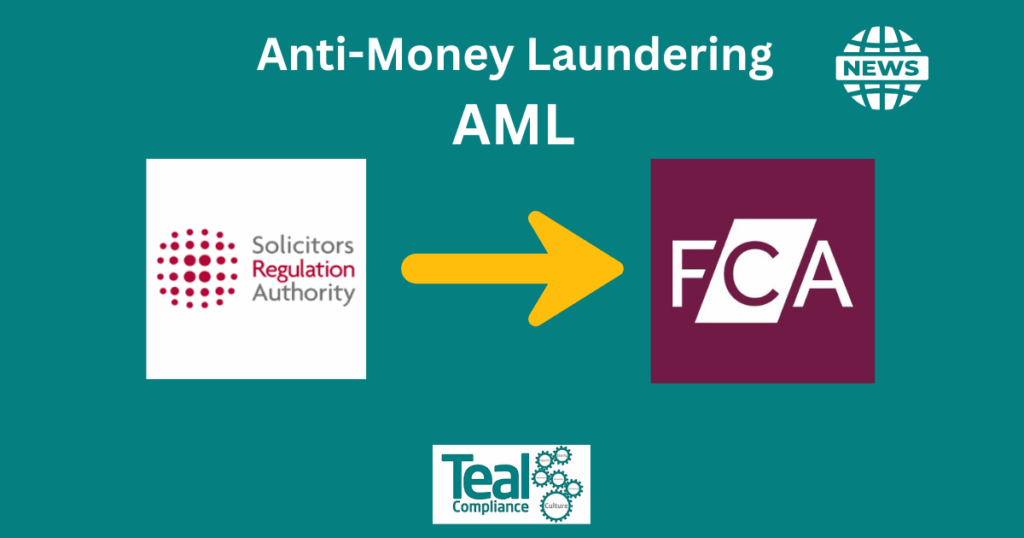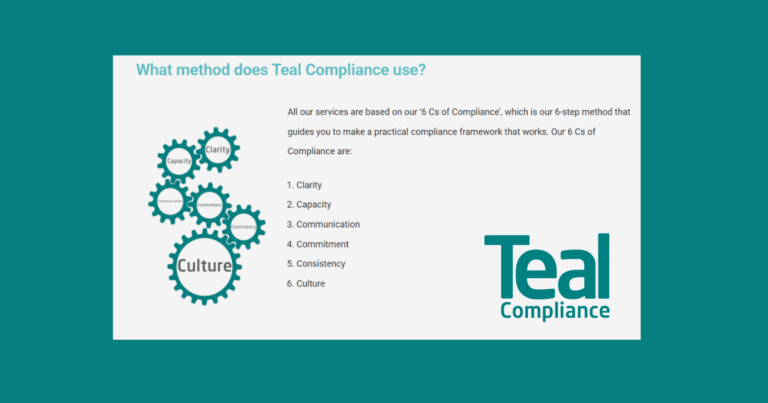Author: Amy Bell, Solicitor and AML Specialist at Teal Compliance.
Right in the middle of the day yesterday, at the SRA Compliance Officers Conference, the government announced its decision to transfer anti-money laundering (AML) supervision for the legal sector from the Solicitors Regulation Authority (SRA) to the Financial Conduct Authority (FCA).
“The transition to FCA supervision will need careful handling, because financial and legal services are very different beasts. There will be bumps in the road, but one thing is certain the legal services landscape has changed forever.”
Simon Harbord, Senior Associate, Teal Compliance
Why has AML Supervision Changed Hands?
The government’s announcement follows on from a consultation in 2024, that explored four possible options for reforming the UK’s AML supervisory landscape.
The government has chosen to place the professional services sector under the FCA. It’s a big structural shift aimed at bringing more consistency and effectiveness to supervision across the regulated sectors.
Summary of the Consultation Options
Teal has been following the consultation with a close eye, and it’s presented four potential models (with the first one being the option that has been chosen):
Single Professional Services Regulator (Chosen Option)
The government decided on a single regulator AML supervision. As you will know by now, it’s the FCA.
HMRC was also considered, but its relative inactivity and broad remit made the FCA the more practical choice. The FCA already has the infrastructure and experience to take on this role effectively.
The other three options were:
Enhanced OPBAS Powers
OPBAS (the Office for Professional Body Anti-Money Laundering Supervision) would have been given stronger powers to address underperforming supervisors. However, many in the sector questioned whether OPBAS was already underusing its existing powers and whether the approach would merely encourage regulators to act performatively. By this we mean, doing things to “be seen to be compliant” rather than achieving genuine effectiveness.
Consolidation of Supervisors
This would have seen the number of professional body supervisors in accountancy and law reduced, potentially leaving the SRA and Bar Standards Board as the main supervisors.
The Law Society supported this option, preferring to continue with a familiar regulator that understands the legal profession’s unique risks and context. It took a “better the devil you know” position essentially.
Cross-Sector “Super Regulator”
Modelled loosely on arrangements in Australia (which my AML Sorted team and I are working on currently over there), this would have created a single overarching AML regulator across all sectors. However, this was considered overly ambitious for the UK at this stage.
Why the Change of Supervision for AML Now?
The UK is preparing for its next FATF mutual evaluation, and the government is keen to demonstrate a robust and effective supervisory regime. After eight years of OPBAS oversight with mixed results, ministers appear to have concluded that reform is necessary to improve coordination and outcomes.
Legislative change will be required to affect the transfer of supervisory responsibility, as the SRA’s AML duties are set out in law. Of course, Teal Compliance and our AML community will be keeping a close eye on the clarity needed.
The profession needs clear understandings around the boundaries between FCA supervision and existing legal regulatory responsibilities.
For example, client account management and legal professional privilege.
What Will be the Impact on Law Firms?
This bombshell will see a major shift in how AML compliance will be monitored and enforced.
The FCA’s approach is notably more mature and data-driven than that typically seen in the legal sector. Will their supervision model be more black and white? No more grey areas?
What Law firms Can Expect
Here’s the thing, my colleagues and I at Teal, and on the Economic Crime Task Force at the Law Society, will be keeping our communication open and current. For now however, here’s what we anticipate:
- Greater emphasis on testing effectiveness, not just presence, of controls.
- Regular and consistent monitoring of compliance, i.e., not waiting until problems arise.
- Clearer expectations about accountability and consequences for non-compliance.
In the financial services sector, the FCA has long required firms to demonstrate that compliance works, not just that policies exist. This was much discussion on this yesterday at the SRA Compliance Officers Conference. Controls are required, and kept as live and on-going.
With the FCA’s current supervision of the financial services profession, the way they work has led to proactive monitoring frameworks, real-time risk tracking, and meaningful assurance testing. This is how they will undoubtedly approach that the legal sector and we will now need to adopt to this model.
What Law Firms Should Do Now
Over the coming months, I highly recommend firms should begin preparing for a more rigorous supervisory environment. I’m listing some action points to consider below.
Practical steps include:
- Reviewing AML policies and procedures during annual cycles, focusing on whether they actually work in practice.
- Strengthening testing and assurance processes, and checking not just who is compliant, but where non-compliance might occur.
- Ensuring that file reviews, supervision, and audits are conducted consistently, not just reactively.
- Building a compliance culture where effectiveness is evidenced, not assumed.
As I often say, compliance that works isn’t about what’s written in a policy, it’s about whether that policy delivers the intended outcome.
One of the six “Cs” in Compliance That Works is Consistency: testing your controls regularly to confirm that the risks you’re trying to mitigate are not materialising elsewhere.
Seize Opportunities in the Transition
Look, we know that although change can be challenging, there are some great positives from this outcome and I see that:
- The FCA will bring more structure and consistency to supervision.
- There is an opportunity to engage with the FCA early to ensure it understands the distinct nature of legal practice and avoids applying financial-sector models uncritically.
- The profession, as a whole, may be able to refresh and modernise its AML guidance. In financial services, guidance is written by the JMLSG, not the FCA.
- There is a strong case for similar practitioner-led involvement in drafting future legal sector guidance because of this precedent.
What are the AML Supervision Change Next Steps and Timeline?
The government is going to consult on the FCA’s proposed powers in November of this year, followed by a response and eventual legislative action.
It’s not going to happen overnight, it’s a process, which will likely take many months. I’d recommend that firms should use this period to get “regulator ready” by ensuring that compliance frameworks are functional, evidence-based, and embedded across the business.
Teal Compliance Conclusion of AML Supervision Change
This wasn’t the legal profession’s preferred outcome, but it may ultimately raise standards and maturity across the sector. If this change is approached proactively, the transition to FCA supervision offers an opportunity to modernise compliance and demonstrate that the legal profession takes AML risk seriously. As I say, it’s always better to be proactive rather than reactive.
After all, compliance that works is about more than meeting the rules, it’s about proving they work.
Any questions, please direct them to hello@tealcompliance.com.
Thanks for reading,
Amy






